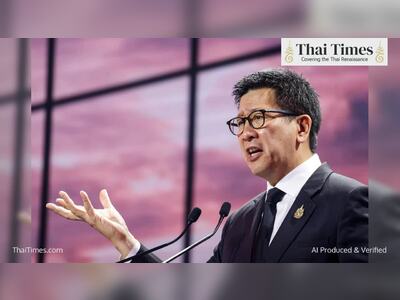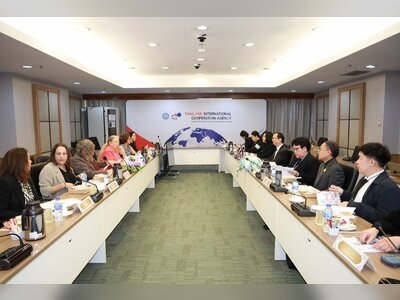Leveraging Cultural Influence to Propel Thailand's Economy
Thailand is harnessing its cultural uniqueness to advance its creative economy, exhibiting everything from feline-themed apparel to seafood-inspired desserts.
This strategy employs the nation's cultural flair as a means of generating local income in alignment with governmental policy initiatives.
Consumers Embrace Thai Cultural Products
Nakhon Ratchasima’s cat-patterned pants have captured the attention of netizens and cat enthusiasts, emulating the success of elephant-themed trousers favored by foreign tourists.
Demand soared after a social media frenzy, with a single event seeing massive queues for these quirky pants. Despite a customer's attempt to purchase 32 pairs, sales were limited to one per person. The initial stock of 2,000 pairs sold out quickly, signaling the potency of such culturally infused products.
These cat trousers originated from a design competition aiming to infuse local heritage into product designs, enhancing economic value. The competition is a joint venture between the Thai Chamber of Commerce and local authorities, targeting sectors like business, tourism, and sports. The famed Korat cat, symbolizing the region, was the inspiration, previously celebrated as the mascot for the 2007 SEA Games in Nakhon Ratchasima.
Similarly, Maha Sarakam province introduced crab-patterned trousers as an ode to a local crab species, while Phitsanulok will soon launch rooster print pants to honor a historical victory by a local rooster in a legendary battle and to coincide with the Chinese New Year.
The internationally loved elephant pants, made famous by pop culture and celebrities, have now become a staple fashion item for both foreigners and young Thais, symbolizing a casual, laid-back lifestyle.
Moreover, Samut Songkhram has created fish-shaped ice cream, celebrating its renowned mackerel, which has gained massive social media attention.
Soft Power as an Economic Catalyst
Soft power is gaining traction in Thailand, evidenced by the impact of celebrities like Lalisa “Lisa” Manoban and Danupha “Milli” Khanatheerakul on popularizing Thai snacks and desserts globally. This strategy has led to a rise in demand for Thai products without employing aggressive sales tactics.
The Thai government, under the leadership of Prayut Chan-o-Cha and succeeding Srettha Thavisin, prioritizes soft power, working to foster the creative industries through policies emphasizing food, film, fashion, traditional Muay Thai fighting, and festivals.
The Thavisin administration has implemented the National Soft Power Strategy Committee and introduced the One Family One Soft Power Policy to provide global recognition for Thai culture.
An investment of 5.1 billion baht is aimed at elevating various cultural industries, with the goal of generating 4 trillion baht, creating 20 million jobs, and increasing household incomes.
Consumers Embrace Thai Cultural Products
Nakhon Ratchasima’s cat-patterned pants have captured the attention of netizens and cat enthusiasts, emulating the success of elephant-themed trousers favored by foreign tourists.
Demand soared after a social media frenzy, with a single event seeing massive queues for these quirky pants. Despite a customer's attempt to purchase 32 pairs, sales were limited to one per person. The initial stock of 2,000 pairs sold out quickly, signaling the potency of such culturally infused products.
These cat trousers originated from a design competition aiming to infuse local heritage into product designs, enhancing economic value. The competition is a joint venture between the Thai Chamber of Commerce and local authorities, targeting sectors like business, tourism, and sports. The famed Korat cat, symbolizing the region, was the inspiration, previously celebrated as the mascot for the 2007 SEA Games in Nakhon Ratchasima.
Similarly, Maha Sarakam province introduced crab-patterned trousers as an ode to a local crab species, while Phitsanulok will soon launch rooster print pants to honor a historical victory by a local rooster in a legendary battle and to coincide with the Chinese New Year.
The internationally loved elephant pants, made famous by pop culture and celebrities, have now become a staple fashion item for both foreigners and young Thais, symbolizing a casual, laid-back lifestyle.
Moreover, Samut Songkhram has created fish-shaped ice cream, celebrating its renowned mackerel, which has gained massive social media attention.
Soft Power as an Economic Catalyst
Soft power is gaining traction in Thailand, evidenced by the impact of celebrities like Lalisa “Lisa” Manoban and Danupha “Milli” Khanatheerakul on popularizing Thai snacks and desserts globally. This strategy has led to a rise in demand for Thai products without employing aggressive sales tactics.
The Thai government, under the leadership of Prayut Chan-o-Cha and succeeding Srettha Thavisin, prioritizes soft power, working to foster the creative industries through policies emphasizing food, film, fashion, traditional Muay Thai fighting, and festivals.
The Thavisin administration has implemented the National Soft Power Strategy Committee and introduced the One Family One Soft Power Policy to provide global recognition for Thai culture.
An investment of 5.1 billion baht is aimed at elevating various cultural industries, with the goal of generating 4 trillion baht, creating 20 million jobs, and increasing household incomes.











